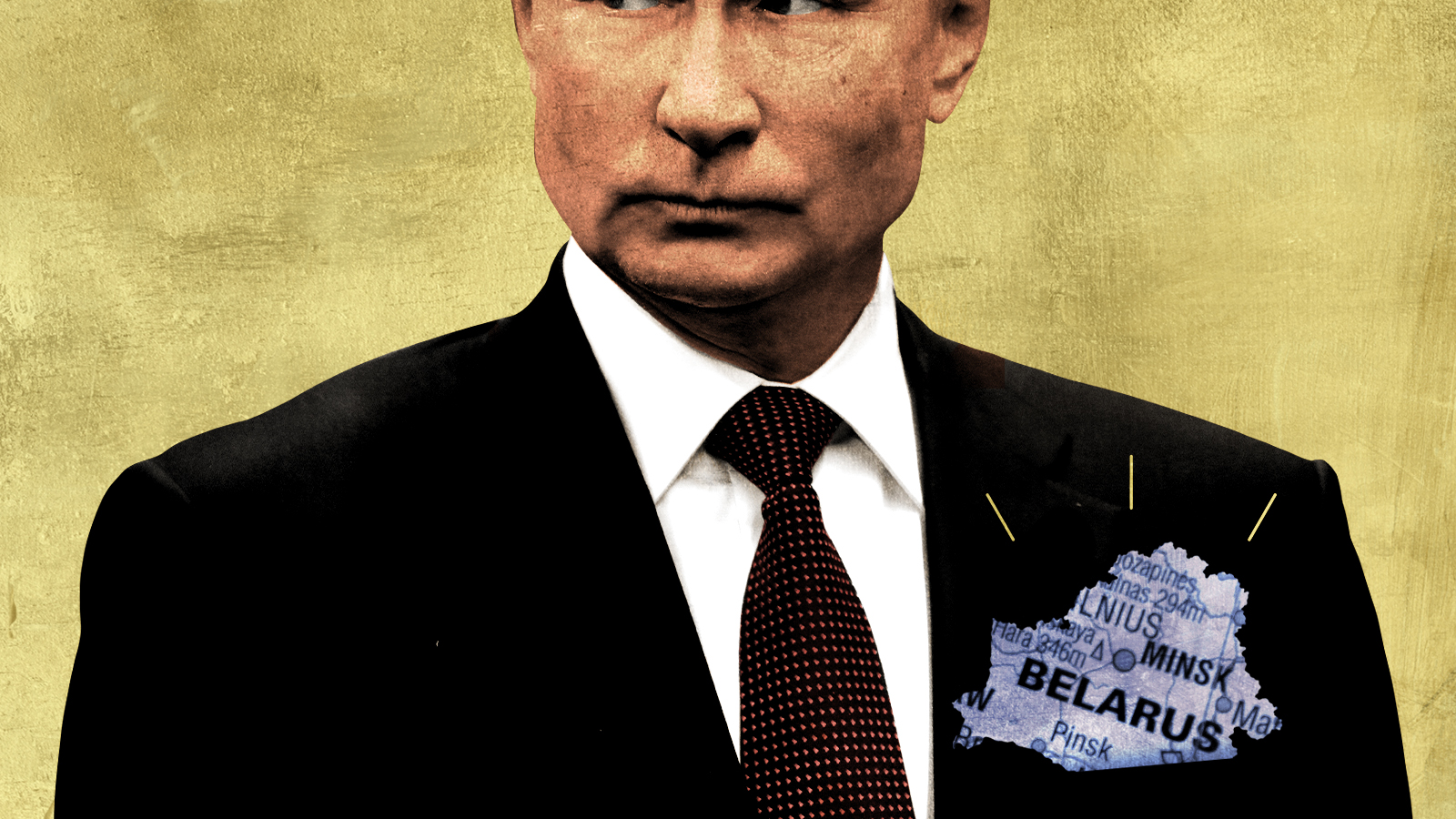The Eastern European country Putin already conquered this year
What happens if Putin takes Kyiv? There's a preview in Minsk.


A free daily email with the biggest news stories of the day – and the best features from TheWeek.com
You are now subscribed
Your newsletter sign-up was successful
One question keeping NATO leaders up at night is whether Russian President Vladimir Putin has designs on other territories beyond Ukraine.
The answer is to be seen in Belarus, now largely a Russian vassal state. How it happened and what life is like in the country of 9.4 million people since Russia stepped in gives a glimpse of the society Putin wants to build for a whole Eurasian empire. This is the world that Putin is fighting for — the world he wants Ukraine to join.
The modern Belarusian state is a creature of 1991, when the Soviet Union dissolved into constituent parts. It borders Poland, the Baltic nations, Russia, and, most importantly for our story, Ukraine. Belarusian President Alexander Lukashenko, who had run a Soviet farm before turning to politics, snagged the presidency when it was established in 1994. With the help of an extensive security apparatus — still called the KGB despite the original's renaming and attempted rehabilitation in Russia — he decided to stick around.
The Week
Escape your echo chamber. Get the facts behind the news, plus analysis from multiple perspectives.

Sign up for The Week's Free Newsletters
From our morning news briefing to a weekly Good News Newsletter, get the best of The Week delivered directly to your inbox.
From our morning news briefing to a weekly Good News Newsletter, get the best of The Week delivered directly to your inbox.
Lukashenko had long played East and West off of each other, first leaning one way, then the other, signing trade deals with both. But his authoritarian sensibilities ensured that it wouldn't last. In his 28 years in power, Lukashenko has clung to two, seemingly contradictory sentiments: nostalgia for the Soviet ideal and a determination to hold on to a sham democracy. Thus, noted authoritarian Lukashenko is a "duly" elected leader, despite evidence of fraud that would make Donald Trump jealous.
It was Belarus' 2020 vote, where he took "80 percent," that finally proved too much for the Belarusian public. Lukashenko's main opponent, with an official 9 percent of the vote — Svetlana Tikhanovskaya — fled the country, and tens of thousands of people ran out into the streets. The protests were met with brutality. Thousands were arrested, many were tortured, and that was the end of any flirtation with the West.
Readers will be shocked, shocked to read that Putin, noted irredentist — and, if you ask President Biden, a war criminal — was happy to help Lukashenko hang on in 2020. Putin had long desired to bring this former Soviet republic tighter into his embrace, and he offered to send in Russian troops to quell the protests. Since 2020, Belarus has been firmly in the client state category.
But even that was apparently not enough. Before Russia invaded Ukraine, Putin decided to make his final move — quietly. How do you take over an entire nation without causing a stir? Joint military exercises are certainly one way to go. In January, Russia sent the first of what would become 30,000 Russian infantry, along with fighter jets, anti-aircraft batteries, and other equipment, into Belarus for a joint exercise with local forces.
A free daily email with the biggest news stories of the day – and the best features from TheWeek.com
Then they stayed. The entire active Belarusian military, comprised of 62,000 troops armed with Soviet-era weapons and largely dependent on Russia for aid, has raised no visible objection. Nor did Putin bother to change the face of the regime: Lukashenko remains in charge, doing whatever Russia tells him to do. Belarus is even changing its constitution to allow Russia to station nuclear weapons on its soil. Many of the Russian forces who participated in the "training exercise" are taking part in the Ukraine invasion, but it comes as a surprise to no one that some have remained behind.
Lukashenko's regime was already repressive. But since Putin moved in, Belarus has become a desert of political dissent. There is no opposition media. There are no longer any protests. For the average Belarusian, if there was any freedom in the country before the 2020 "elections," it's gone now. Belarus has retained much of the Soviet economic system, along with its inefficiencies and stagnation. The main question about Belarusians' future now is whether Putin will send them to war with Ukraine.
The nation died with a whimper and largely without notice. Who mourns the independent dictatorship of Belarus?
Now, Putin is trying crush an independent — and democratic — Ukraine.
When Russia invaded, numerous foreign policy and military experts have said, the plan was to replace Ukrainian President Volodymyr Zelensky's government with a regime that would happily join the growing Russian empire.
That theory makes sense of Russia's behavior, but also its timing. There was no threat of an invasion when quasi-puppet (sorry, President) Viktor Yanukovych ruled Ukraine with more than a little help from Russia. But after Yanukovych was chased from office by the Maidan protests in 2013 and 2014, Russia promptly invaded Crimea. Now that the larger war is underway, there's talk that Yanukovych could be propped back up to take Zelensky's place if Russia succeeds.
What would that be like? Look to Belarus to see what the future may hold if Kyiv falls.
Jason Fields is a writer, editor, podcaster, and photographer who has worked at Reuters, The New York Times, The Associated Press, and The Washington Post. He hosts the Angry Planet podcast and is the author of the historical mystery "Death in Twilight."
-
 Democrats push for ICE accountability
Democrats push for ICE accountabilityFeature U.S. citizens shot and violently detained by immigration agents testify at Capitol Hill hearing
-
 The price of sporting glory
The price of sporting gloryFeature The Milan-Cortina Winter Olympics kicked off this week. Will Italy regret playing host?
-
 Fulton County: A dress rehearsal for election theft?
Fulton County: A dress rehearsal for election theft?Feature Director of National Intelligence Tulsi Gabbard is Trump's de facto ‘voter fraud’ czar
-
 What is ‘Arctic Sentry’ and will it deter Russia and China?
What is ‘Arctic Sentry’ and will it deter Russia and China?Today’s Big Question Nato considers joint operation and intelligence sharing in Arctic region, in face of Trump’s threats to seize Greenland for ‘protection’
-
 New START: the final US-Russia nuclear treaty about to expire
New START: the final US-Russia nuclear treaty about to expireThe Explainer The last agreement between Washington and Moscow expires within weeks
-
 What would a UK deployment to Ukraine look like?
What would a UK deployment to Ukraine look like?Today's Big Question Security agreement commits British and French forces in event of ceasefire
-
 Did Trump just end the US-Europe alliance?
Did Trump just end the US-Europe alliance?Today's Big Question New US national security policy drops ‘grenade’ on Europe and should serve as ‘the mother of all wake-up calls’
-
 Is conscription the answer to Europe’s security woes?
Is conscription the answer to Europe’s security woes?Today's Big Question How best to boost troop numbers to deal with Russian threat is ‘prompting fierce and soul-searching debates’
-
 Trump peace deal: an offer Zelenskyy can’t refuse?
Trump peace deal: an offer Zelenskyy can’t refuse?Today’s Big Question ‘Unpalatable’ US plan may strengthen embattled Ukrainian president at home
-
 Vladimir Putin’s ‘nuclear tsunami’ missile
Vladimir Putin’s ‘nuclear tsunami’ missileThe Explainer Russian president has boasted that there is no way to intercept the new weapon
-
 The Baltic ‘bog belt’ plan to protect Europe from Russia
The Baltic ‘bog belt’ plan to protect Europe from RussiaUnder the Radar Reviving lost wetland on Nato’s eastern flank would fuse ‘two European priorities that increasingly compete for attention and funding: defence and climate’
